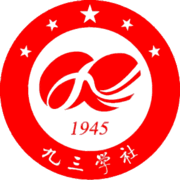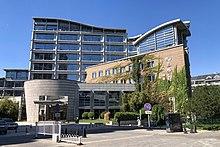Jiusan Society | |
|---|---|
 | |
| President | Wu Weihua |
| Founded | 4 May 1946 |
| Headquarters | Beijing, China |
| Newspaper | Democracy and Science (民主与科学)[1] Central Communications of the Jiusan Society (九三中央社讯)[2][3] |
| Membership | 167,218[4] |
| Ideology | Socialism with Chinese characteristics[5] |
| National affiliation | United Front |
| National People's Congress | 64 / 2,980 |
| Standing Committee of NPC | 5 / 175 |
| Website | |
| www | |
| |
| Jiusan Society | |||||||
|---|---|---|---|---|---|---|---|
| Chinese name | |||||||
| Simplified Chinese | 九三学社 | ||||||
| Traditional Chinese | 九三學社 | ||||||
| Literal meaning | September Third Society | ||||||
| |||||||
| Tibetan name | |||||||
| Tibetan | དགུ་གསུམ་ཤེས་རིག་སློབ་ཚོགས | ||||||
| |||||||
| Zhuang name | |||||||
| Zhuang | Giujsanh Yozse | ||||||
| Mongolian name | |||||||
| Mongolian Cyrillic | “ 9 · 3 ” эрдэм шинжилгээний нийгэмлэг | ||||||
| Mongolian script | ﹃9 · 3 ﹄ ᠡᠷᠳᠡᠮ ᠰᠢᠨᠵᠢᠯᠡᠭᠡᠨ ᠦ ᠨᠡᠶᠢᠭᠡᠮᠯᠢᠭ | ||||||
| Uyghur name | |||||||
| Uyghur | « 3 - سېنتەبىر » ئىلمىي جەمئىيىتى | ||||||
| |||||||
| Manchu name | |||||||
| Manchu script | ᠵᡳᡠᠰᠠᠨ ᡧᡠᡝᡧᡳᡝ | ||||||
| Romanization | Jiusan Xueshe | ||||||
The Jiusan Society (Chinese: 九三学社; pinyin: Jiǔsān Xuéshè; lit. 'Nine-Three Academic Society') is one of the eight legally recognised minor political parties in the People's Republic of China that follow the direction of the Communist Party of China and are members of the Chinese People's Political Consultative Conference.[6][7] The party's original name was "Democracy and Science Forum" on its informal founding in 1944; the current name refers to the date of Chinese victory in the Second Sino-Japanese War (3 September 1945).[8]
The party's mission statement is to "lead the nation to power and the people to prosperity," though this must be subordinate to the national interest. The party had a membership of 167,218[4] members by June 2016,[9] mostly high- and medium-level intellectuals in the fields of science, technology, education, culture, and medicine.
Presidents
- Xu Deheng (许德珩) (1946–1987)
- Zhou Peiyuan (周培源) (1987–1992)
- Wu Jieping (吴阶平) (1992–2002)
- Han Qide (韩启德) (2002–2017)
- Wu Weihua (武维华) (2017–present)[10]
References
- ^ "WKE". ds191954.net. Archived from the original on 23 December 2017. Retrieved 22 December 2017.
- ^ "搜索". www.93.gov.cn. Archived from the original on 27 December 2017. Retrieved 27 December 2017.
- ^ "社史研究通讯". www.93.gov.cn. Archived from the original on 24 July 2019. Retrieved 27 December 2017.
- ^ a b "九三学社简介". www.93.gov.cn. Archived from the original on 15 January 2019. Retrieved 22 December 2017.
- ^ "九三学社章程". www.93.gov.cn. Archived from the original on 17 January 2019. Retrieved 22 December 2017.
- ^ Seymour, James D. (1987). China's satellite parties. M.E. Sharpe. pp. 28, 88. ISBN 978-0-87332-412-0.
- ^ Lim, Louisa (5 May 2014). The People's Republic of Amnesia: Tiananmen Revisited. Oxford University Press. p. 114. ISBN 978-0-19-934772-8.
- ^ Lu Yan (27 September 2018). "Heading in One Direction-- Beijing Review". Beijing Review. Retrieved 25 January 2021.
- ^ "A Quantitative Summary of Jiusan Society on its 71st Anniversary". www.93.org.cn. Archived from the original on 14 September 2016. Retrieved 4 September 2016.
- ^ "武维华主席_主席、副主席_九三学社中央委员会". www.93.gov.cn. Archived from the original on 23 December 2017. Retrieved 22 December 2017.
External links
